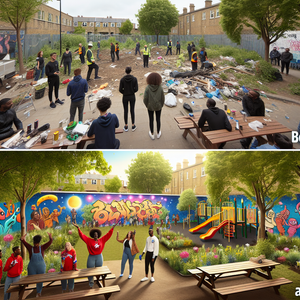Smart Cities: Balancing Technology and Humanity

Smart cities represent a transformative shift in how urban environments are designed and managed. By utilizing data analytics and connected technologies, these cities can optimize everything from traffic flow to energy consumption. For instance, Barcelona has implemented smart streetlights that adjust brightness based on pedestrian activity and weather conditions, reducing energy waste while enhancing public safety. Moreover, smart cities can improve public services. A notable example is Singapore, where a comprehensive smart traffic management system uses real-time data to alleviate congestion and improve public transport efficiency. These innovations not only contribute to sustainability goals but also foster a sense of community by providing residents with seamless experiences in their daily lives. The promise of smart cities lies not just in their technological prowess but in their potential to enhance urban living conditions for everyone.
The Human Element: Ensuring Inclusivity
Despite the potential benefits of smart technologies, the challenge lies in ensuring that these innovations do not inadvertently exclude marginalized communities. When technology becomes a focal point, there is a risk of neglecting the voices of those who may not be tech-savvy or who lack access to the latest devices. For instance, low-income residents in many cities may struggle to participate in digital platforms that influence urban planning decisions. To counteract this, urban planners must prioritize inclusivity in their designs. Engaging with community members through workshops, surveys, and public forums can help identify the unique needs and concerns of diverse populations. For example, in Helsinki, the city has adopted a participatory budgeting approach, allowing residents to allocate funds for local projects. This ensures that technology serves everyone rather than a select few, creating a sense of ownership and fostering a more inclusive urban environment.
Balancing Data with Empathy
While data-driven approaches are essential for informed decision-making, they should not overshadow the importance of empathy and human experience. Urban planners must recognize that behind every data point is a person with unique needs and aspirations. The development of smart housing solutions, for example, should consider not only energy efficiency but also the emotional well-being of residents. Cities like Amsterdam are leading by example, using both quantitative data and qualitative insights to inform urban design. Through initiatives such as neighborhood surveys and stakeholder meetings, planners gather feedback that shapes projects to meet the specific needs of the community. This balance of data and empathy fosters a sense of belonging and ensures that urban spaces are livable and accessible for all.
The Future of Smart Cities
As we move toward a future dominated by smart technologies, urban planners must remain vigilant in their approach. The goal should not be to create cities that merely function effectively but to design environments that nurture human connections and promote equitable access to resources. Incorporating diverse perspectives in the planning process and maintaining a human-centered approach will be crucial in achieving this balance. Moreover, the career landscape for urban planners is evolving to encompass a variety of skills and competencies. Opportunities in smart city planning include: 1. Data-Driven Design: Understanding and utilizing big data to inform urban planning decisions. 2. Community Engagement: Facilitating inclusive discussions that allow all voices to be heard in the planning process. 3. Sustainability Practices: Implementing eco-friendly technologies and practices to promote environmental health. 4. Interdisciplinary Collaboration: Working alongside professionals from various fields, including technology, sociology, and environmental science. 5. Policy Development: Crafting policies that support equitable access to smart city resources and services. 6. Technology Integration: Leveraging emerging technologies to enhance urban infrastructure and services. 7. Urban Resilience Planning: Developing strategies to make cities more resilient to climate change and other challenges. These considerations not only enhance the effectiveness of urban planners but also ensure that smart cities can be inclusive, safe, and sustainable for all residents.
The journey toward creating smart cities is fraught with challenges and opportunities. By prioritizing the human element and fostering community engagement, urban planners can ensure that technology serves as a tool for enhancing quality of life rather than a barrier to inclusion. As we design the cities of tomorrow, it is imperative that we strike a harmonious balance between innovation and humanity, crafting urban spaces that are as compassionate as they are efficient. In doing so, we can create smart cities that truly reflect the values of all their residents, paving the way for a more sustainable and equitable urban future.
Smart City Data Analyst
City governments, consulting firms, tech companies specializing in urban solutions (e.g., Siemens, IBM)
Job Description
Analyze large datasets to inform urban planning decisions and improve city services.
Develop visualizations and reports that communicate data insights to stakeholders and the public.
Collaborate with city officials and technology teams to identify key performance indicators for smart city initiatives.
Urban Sustainability Coordinator
Non-profit organizations, municipal sustainability offices, environmental consulting firms
Job Description
Design and implement sustainability programs that align with smart city initiatives, focusing on energy efficiency and waste reduction.
Conduct community workshops to educate residents on sustainable practices and gather feedback on local projects.
Work with cross-functional teams to integrate sustainable technologies into urban planning processes.
Key Skills
Knowledge of LEED certification
Experience with renewable energy projects
Strong project management skills
Community Engagement Specialist
City planning departments, non-profits focused on social equity, urban development firms
Job Description
Facilitate public forums and outreach events to gather input from diverse community members on urban planning projects.
Develop communication materials that effectively convey project goals and benefits to residents.
Utilize social media and digital platforms to engage with the community and encourage participation.
Unique Skills
Proficiency in conflict resolution and public speaking
Experience with participatory budgeting processes
Smart Mobility Planner
Transportation agencies, consulting firms, tech companies focused on mobility solutions (e.g., Uber, Lyft)
Job Description
Plan and implement innovative transportation solutions, such as smart traffic management systems and bike-sharing programs.
Analyze traffic patterns using data analytics to optimize public transportation routes and schedules.
Collaborate with technology providers to integrate smart mobility solutions into the urban infrastructure.
Key Qualifications
Background in urban planning or transportation engineering
Familiarity with GIS software
Strong analytical skills
Urban Resilience Planner
Government agencies, environmental organizations, research institutions focused on urban resilience
Job Description
Develop strategies to enhance a city's resilience to climate change and natural disasters through smart urban design.
Conduct risk assessments to identify vulnerabilities in existing urban infrastructure and services.
Collaborate with engineers, architects, and environmental scientists to create adaptive solutions.
Unique Skills
Knowledge of climate adaptation strategies
Experience with public policy development


